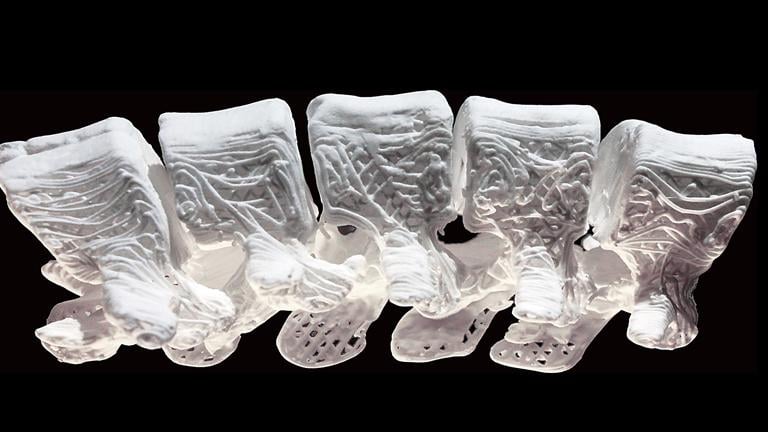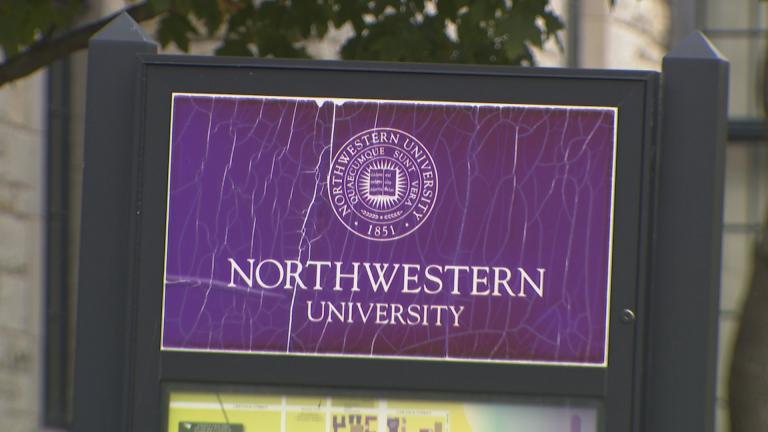Northwestern University chemistry professor Sir Fraser Stoddart was one of three scientists awarded the Nobel Prize in Chemistry on Wednesday for developing the world’s smallest machines.
The Scottish chemist joined "Chicago Tonight" the following day to discuss his work, its applications and the emotions he felt upon learning he'd won the renowned award.
Stoddart designed and synthesized “molecular machines,” or molecules equipped with motors that allow them to move and perform tasks. Jean-Pierre Sauvage of the University of Strasbourg and Bernard L. Feringa of the University of Groningen in the Netherlands were also awarded the prestigious prize for their work in the field.
The machines are 1,000 times thinner than a human hair and could potentially be used in the health care field to deliver drugs or directly attack cancerous cells within the bloodstream.
Molecules move randomly, but molecular machines allow the chemists to control and coordinate their movement when energy, like sunlight, is applied.
“I applaud the fact that for once, in chemistry, Stockholm has recognized a piece of chemistry that is extremely fundamental in its making and being,” Stoddart said.
In its announcement of the prize Wednesday, the Royal Swedish Academy of Sciences singled out Stoddart’s work in 1991 demonstrating how a molecular wheel could be moved along a molecular axle.
The academy, which has presented the award since 1901, compared the significance of the chemists' molecular motors with an earlier type of motor.
"In terms of development, the molecular motor is at the same stage as the electric motor was in the 1830s, when scientists displayed various spinning cranks and wheels, unaware that they would lead to washing machines, fans and food processors." the academy wrote in its announcement.
 Stoddart thanked his late wife, Norma, while speaking at a ceremony for his Nobel Prize win on Wednesday. (Evan Garcia / Chicago Tonight)
Stoddart thanked his late wife, Norma, while speaking at a ceremony for his Nobel Prize win on Wednesday. (Evan Garcia / Chicago Tonight)
At a ceremony organized by Northwestern on Wednesday, Stoddart warned his students in attendance that the road to winning a Nobel Prize was a long, hard one.
“Through the early years, you take some criticism because people don't quite understand why you're doing what you're doing,” Stoddart said. “But that eventually ebbs away and then the recognition starts to come and the latter part of 30 years, for me, is exactly what has happened.”
Stoddart, a native of Edinburgh, Scotland, was knighted by Queen Elizabeth II in 2007 for his work in molecular nanotechnology. He chose Wednesday's ceremony as an opportunity to express his disapproval of Brexit, the United Kingdom's decision to withdraw from the European Union.
"Science is global. A lot of my colleagues are from other parts of the world, as I am, and have been welcomed to America," Stoddart said. "If I look back to my old country, it's in a real mess because it thinks that it can erase borders to people coming into them. This will not be good for science."
The three chemists will split the $980,000 of prize three ways. Stoddart said he plans to donate some of his share to educational institutions.
“One of the things that drives academia in this country is philanthropy,” he said.
Watch video of Stoddart and his students in his Northwestern University laboratory:
Follow Evan Garcia on Twitter: @EvanRGarcia
 Northwestern Announces Record Voter Registration for Incoming Freshman
Northwestern Announces Record Voter Registration for Incoming Freshman
Sept. 30: This week, the university announced that 96 percent of incoming freshman have registered to vote, thanks in part to a new website launched this fall.
Related stories:
 Northwestern Scientists Create Synthetic Bone Using 3-D Printer
Northwestern Scientists Create Synthetic Bone Using 3-D Printer
Sept. 28: New technology developed in Chicago could lead to major advances in healing broken bones and other sports medicine injuries.
 New Cancer Predictor Found by Northwestern Scientists
New Cancer Predictor Found by Northwestern Scientists
Feb. 26: There's a new way to measure age that might prove helpful in assessing an individual's risk of developing cancer, according to a recent Northwestern University study. Learn about epigenetic age and how it can impact your health.








